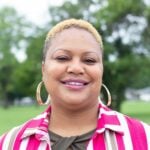Over the weekend I watched “Women of the Movement,” an episodic series about the life and death of Emmett Till and the lifelong struggle for justice for his lynching by his mother, Mamie Till-Mobley.
We know how it ends, and yet I still had to watch.
Some say this is Black trauma and don’t want to think about it. I can’t disagree that these are traumatic events, but I’m compelled to watch and read these real-life accounts. It’s imperative that we educate ourselves about history, so we know what has led us to this point, how we avoid repeating history and how we continue to push for a better society.
Yes, it is traumatic. Black people’s lives in this country have been traumatic since our ancestors stepped off the first slave ship. As I watched this traumatic story unfold, I couldn’t help but shed tears at the pain and fear I imagined Emmett felt. I thought about how heavy the burden has always been on Black children. Youthful transgressions — both real and perceived — of Black children could and have resulted in death. Trayvon Martin, Tamir Rice, Cornelius Fredericks and Cedric “C.J.” Lofton and countless more Black youth, specifically males, have joined Till in dying way too young and for no reason other than white supremacy says their lives are less valuable.
While we know their stories and the stories of others who’ve been killed in the name of white supremacy, how many stories are unknown? We know about Dr. Martin Luther King Jr., Medgar Evers, Addie Mae Collins, Cynthia Wesley, Carole Robertson and Carol Denise McNair, but how many other little girls and freedom fighters are buried in unmarked graves or in gravesites that no longer exist? How many stories and people have been long forgotten because their families were too afraid to say a word? How much violence have we forgotten about because it’s too painful to remember?
I had to reflect on the fear Moses Wright, Emmett’s uncle, felt when the white men came looking for Emmett. The fear all Black people in the South before the Civil Rights Movement felt. (I want to note the 1950s weren’t that long ago. Someone born the year Emmett was killed, 1955, is 67 years old.) Never looking a white person in the eye, always saying Mr. or sir, Mrs. or ma’am, had to be done just to survive. A Black person could never give the perception that he or she was on equal footing as a white person. (Again, this wasn’t too long ago. I’m going to go out on a limb here and say there are some people who still hold these views and some of them held positions of power — and some of them passed those views down to their children, who also hold positions of power. Could that be how systemic racism works and why it’s still in effect?) The fear of making one wrong move — whether intentional or accidental — that could result in loss of livelihood or life was always hovering over Black people.
The fear wasn’t unfounded. The amount of violence done to Black people and perpetrated by white people is often glossed over or forgotten altogether. Today, we like to talk about how Black people are violent. White people aren’t viewed as violent. I’m not here to argue Black people aren’t violent. Instead, I’m here to ask why that stereotype exists for us, but the group that has actually destroyed whole communities, lynched men, women and children, held slaves and done all manner of sadistic, vile acts is somehow viewed as nonviolent or less violent, even peace loving as a whole. Before Ahmaud Arbery there was James Byrd Jr. Byrd was dragged by a pickup truck for miles and murdered by three white men. We’ve seen countless mass shootings at schools, churches (Mother Emanuel AME Church) and businesses perpetrated by white men. We’ve seen white mob violence in Charlottesville, Virginia, and the insurrection of Jan. 6, 2021, yet we pretend white people aren’t violent and place violence squarely on the shoulders of Black people, who’ve been victimized by state-sanctioned and white vigilante violence (also often state sanctioned, by the way).
While our history is definitely traumatic and traumatizing, trauma isn’t all we are. I also reflected on that double-edged sword known as strength that Till-Mobley exhibited. We shouldn’t have to be so strong, yet we are. We shouldn’t have to endure so much, yet we do. Being ridiculously strong shouldn’t be a point of pride, yet it is.
My heart hurts and I shed tears for people I’ve never met, but I know them. They are me. They are my family. Those stories deserve to be heard, which is why I will always listen. It’s all a part of our painful yet beautiful culture.










